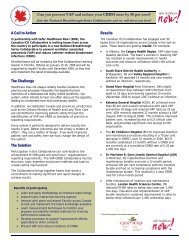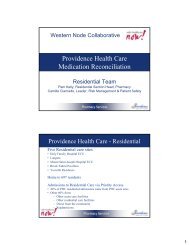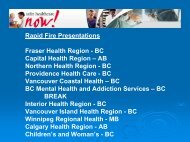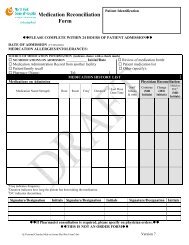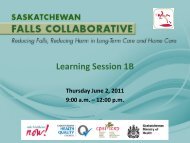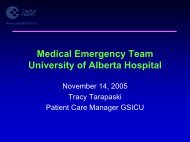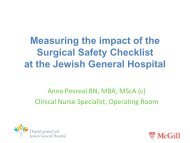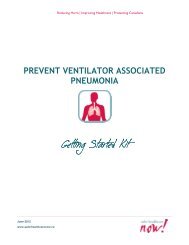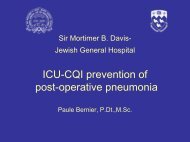Medication Reconciliation in Canada: Raising the Bar (2012) - CIHI
Medication Reconciliation in Canada: Raising the Bar (2012) - CIHI
Medication Reconciliation in Canada: Raising the Bar (2012) - CIHI
- No tags were found...
Create successful ePaper yourself
Turn your PDF publications into a flip-book with our unique Google optimized e-Paper software.
ReferencesBaker, G.R., Norton, P.G., Fl<strong>in</strong>toft, V., et al. (2004). Canadian Adverse Events Study: <strong>the</strong> <strong>in</strong>cidence ofadverse events among hospital patients <strong>in</strong> <strong>Canada</strong>. CMAJ, 170(11), 1678-86.Boockvar K, Fishman E, Kyriacou CK, et al. (2004). Adverse events due to discont<strong>in</strong>uations <strong>in</strong> druguse and dose changes <strong>in</strong> patients transferred between acute and long-term care facilities. ArchIntern Med., 164:545-550Etchells, E. et al. (<strong>2012</strong>). The Economics of Patient Safety <strong>in</strong> Acute Care. Technical Report.Published by <strong>the</strong> Canadian Patient Safety Institute, <strong>2012</strong>. Available from: www.patientsafety<strong>in</strong>stitute.ca/English/research/commissionedResearch/EconomicsofPatientSafety/Documents/Economics%20of%20Patient%20Safety%20-%20Acute%20Care%20-%20F<strong>in</strong>al%20Report.pdfFeldman, L. S., Costa, L. L., Feroli, E. R., Nelson, T., Poe, S. S., Frick, K. D., Efird, L. E. and Miller,R. G. (<strong>2012</strong>). Nurse-pharmacist collaboration on medication reconciliation prevents potential harm.J. Hosp. Med., 7: 396–401.Forster, A.J., Murff, H.J., Peterson, J.F., Gandhi, T.K., Bates, D.W. (2003). The <strong>in</strong>cidence andseverity of adverse events affect<strong>in</strong>g patients after discharge from <strong>the</strong> hospital. Ann Intern Med,4,138(3), 161-7.Hohl, C.M., Nosyk, B., Kuramoto, L., Zed, P.J., Brubacher, J.R., Abu-Laban, R.B., et al. (2011).Outcomes of emergency department patients present<strong>in</strong>g with adverse drug events. Ann Emerg Med,58(3), 270-279.Institute of Medic<strong>in</strong>e. (2006). Prevent<strong>in</strong>g <strong>Medication</strong> Errors: Quality Chasm Series. Wash<strong>in</strong>gton,D.C.: National Academies Press.Pronovost P, Weast B, Schwarz M, Wyskiel RM, Prow D, Milanovich SN, Berenholtz S, Dorman T,Lipsett P. (2003). <strong>Medication</strong> reconciliation: a practical tool to reduce <strong>the</strong> risk of medication errors.J Crit Care, 18(4):201-5. PubMed PMID: 14691892Samoy, L.J., Zed, P.J., Wilbur, K., et al. (2006). Drug-related hospitalizations <strong>in</strong> a tertiary care<strong>in</strong>ternal medic<strong>in</strong>e service of a Canadian hospital: a prospective study. Pharmaco<strong>the</strong>rapy,26,1578-86.Victorian Order of Nurses (VON) <strong>Canada</strong>, Canadian Patient Safety Institute, and Institute forSafe <strong>Medication</strong> Practices <strong>Canada</strong>. (2010). Safer Healthcare Now! <strong>Medication</strong> <strong>Reconciliation</strong><strong>in</strong> Homecare Pilot Project. Available from: www.ismp-canada.org/download/MedRec/SHN_<strong>Medication</strong>_<strong>Reconciliation</strong>_<strong>in</strong>_Homecare_Pilot_Project_Report_F<strong>in</strong>al_Feb_2010.pdf.24 <strong>Medication</strong> <strong>Reconciliation</strong> <strong>in</strong> <strong>Canada</strong>: Rais<strong>in</strong>g <strong>the</strong> <strong>Bar</strong>



